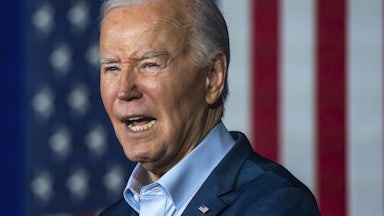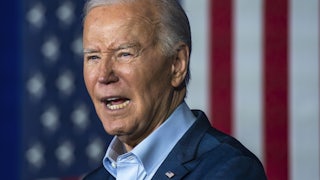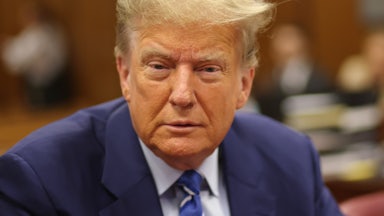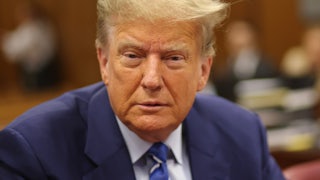On January 6, terrorists—encouraged by former President Donald Trump and enabled by his Republican supporters in Congress—attacked the United States Capitol. And as they came for the republic, they also came for something else: Beltway journalists.
This is true in the literal sense, as rioters etched “Murder the Media” into a Capitol door. But it is also true in a more challenging philosophical sense, as this violence imploded at the very altar of political journalism: the shrine of detached, “both-sides” reportage erected by media outlets to avoid specious accusations of bias and provide cover for Republican politics that were, at best, deeply shameful and, at worst, lethally illiberal.
Mainstream media editors of political coverage in Washington are at a crossroads, though they may not yet have fully realized their predicament. After years of investing in an approach to politics popularly characterized as the “view from nowhere”—in which “objectivity” is performed by reporters as a “he said, she said” dance without regard to either news value or truth—they have had their once-comfortable performance space invaded by the rioters. To move forward from here without confronting the long-deflating bubble of “both-sides” journalism, which is profitable for the D.C. book party circuit but ill-suited to maintaining both good government and a public trust in the media, is to ensure that illiberalism will continue to flourish.
Moreover, if reporters who were at the Capitol on January 6—at once survivors and chroniclers of the crime—continue to be constrained by these established, poorly devised rules for Beltway journalism, it’s reasonable for the public to fear for their personal ability to conduct their work—and, worse, that a historic, violent crime at the seat of our government will be sanitized in a pointless pursuit of giving Republicans the benefit of the doubt they’ve spent years forfeiting.
Republicans like Senate Minority Leader Mitch McConnell recognized years ago that “the view from nowhere” media doctrine could work to his advantage. With no lens of “right” or “wrong” imposed on political reporting—the entire idea of moral arbitration replaced with a meaningless array of horse-race or process coverage that treated both sides as equal regardless of who acted in good faith—he could manipulate the media into any outcome he wanted while avoiding critical skepticism. If, for example, McConnell’s fabrication and application of a so-called “Biden rule” in one instance prevented the seating of Merrick Garland on the Supreme Court while speeding the seating of Amy Coney Barrett in another, that some observers might helplessly label the Kentucky senator a hypocrite after the fact was a small price to pay.
But with clashes and bangs, tear gas and Confederate flags breaching the Capitol for the first time in our nation’s history, the game of treating Republicans and Democrats as equivalent should come to a violent end. The media’s powerbrokers should, at long last, confront the way their previous decisions in the Trump era brought us here and the signal it sends to the reporters they’re tasked with protecting if they continue to stay the course.
Famously, privileged reporters like Peter Baker of The New York Times like to flaunt for the record that they do not vote, as if the act of being a reporter somehow invalidates his American citizenship. If American politics is merely something the media observes from an inarticulable neutral position, then nothing can ever truly be “at stake.” This is, naturally, an absurd premise to found political journalism upon, but it is even more hollow and dangerous now that it’s abundantly clear that what was at stake in that assault on the Capitol was lives, including those of journalists.
Reporters were among the many constituencies who thought they might die at the hands of rioters in the Capitol on January 6. Even though the president’s involvement in inciting that violence is no longer on trial, the reporters tasked with helping the American people understand what happened that day, along with the editors and producers responsible for their coverage, face important questions.
Should journalists doing live shots from roughly the same place where they thought they might die, divorce themselves and their lived experience from coverage of the current group of congressional Republicans or future investigations of the Capitol riot, as if they were not witnesses to, and survivors of, this very traumatic case at hand? Should they pretend now that there are two sides to this story, that a retreat to a nowhere-view is rational or defensible? Who is actually served by continuing this approach? (Hint: It’s the people who tried to overturn a free and fair election, who now want to get off scot-free.)
When the vast majority of Senate Republicans voted against convicting Trump—just as the vast majority of House Republicans voted against impeachment—it was a dark day for America. But let us not overlook that it also was an invalidation of the trauma experienced by those who thought they would perish in the attack that day, including reporters who will have to ask these same lawmakers questions every day, in perpetuity, as if nothing happened. What once were benign queries in a Capitol hallway on matters such as future omnibus spending packages will be something different to the framers of the questions, who will be forced to look in the eyes of people who were complicit in their attempted murder, and who allowed themselves to be recorded for posterity voicing their indifference toward the lives of others.
I spent seven years working in the Capitol every day alongside many of these reporters, and while I did not like or revere all of them, I nevertheless believe they deserve better. More than that, I believe that the country deserves more than what it’s getting—a fuller understanding of the seriousness of this attack, informed by the clarity and detail of reporters’ personal experiences.
Journalists enjoy a privilege and a platform to use their experience to tell the American people a clear story of how rioters encouraged by the president almost succeeded in orchestrating a mass execution event at the Capitol. If reporters have to contort themselves into a sanitized, “objective” view of what happened on January 6, either because that has become their comfort zone or because they have been coerced by newsroom leaders into treating one of the most important stories in American history like a meaningless soliloquy on the Senate floor, we all lose.
The work of undoing decades of “training” in divorcing humanity from political coverage will not happen overnight. I keep thinking about the House impeachment managers who repeatedly have asked, “if this is not an impeachable offense, what is?” And I have asked myself, if this is not the event that frees reporters from the chains of “both-sidesism,” when one side, the Republicans, contributed to an attack in which reporters almost died, what will?
In March 2016, when I voluntarily left a relatively high-profile career in political journalism, young and ascending the golden ladder of the field, the question I faced most often was, “Why?” The real answer was long and complicated, and centered largely around how useless to the project of government accountability I felt, constrained by the orthodoxy of separating morality from regular coverage of Congress. But the brief, social answer I have settled on as my stock response is, “I didn’t want to die at a Donald Trump rally.”
In 2021, reporters did almost die at a Donald Trump rally. And if their editors don’t help them adjust the norms of the work and make them feel empowered to report as if their own lives matter, I fear many more talented people—journalists who don’t see themselves as divorced from their fellow citizens; who want to strengthen this nation’s civic fabric and materially improve the lives of Americans—could give up on this project. And the existential threat to the republic will persist and grow.








